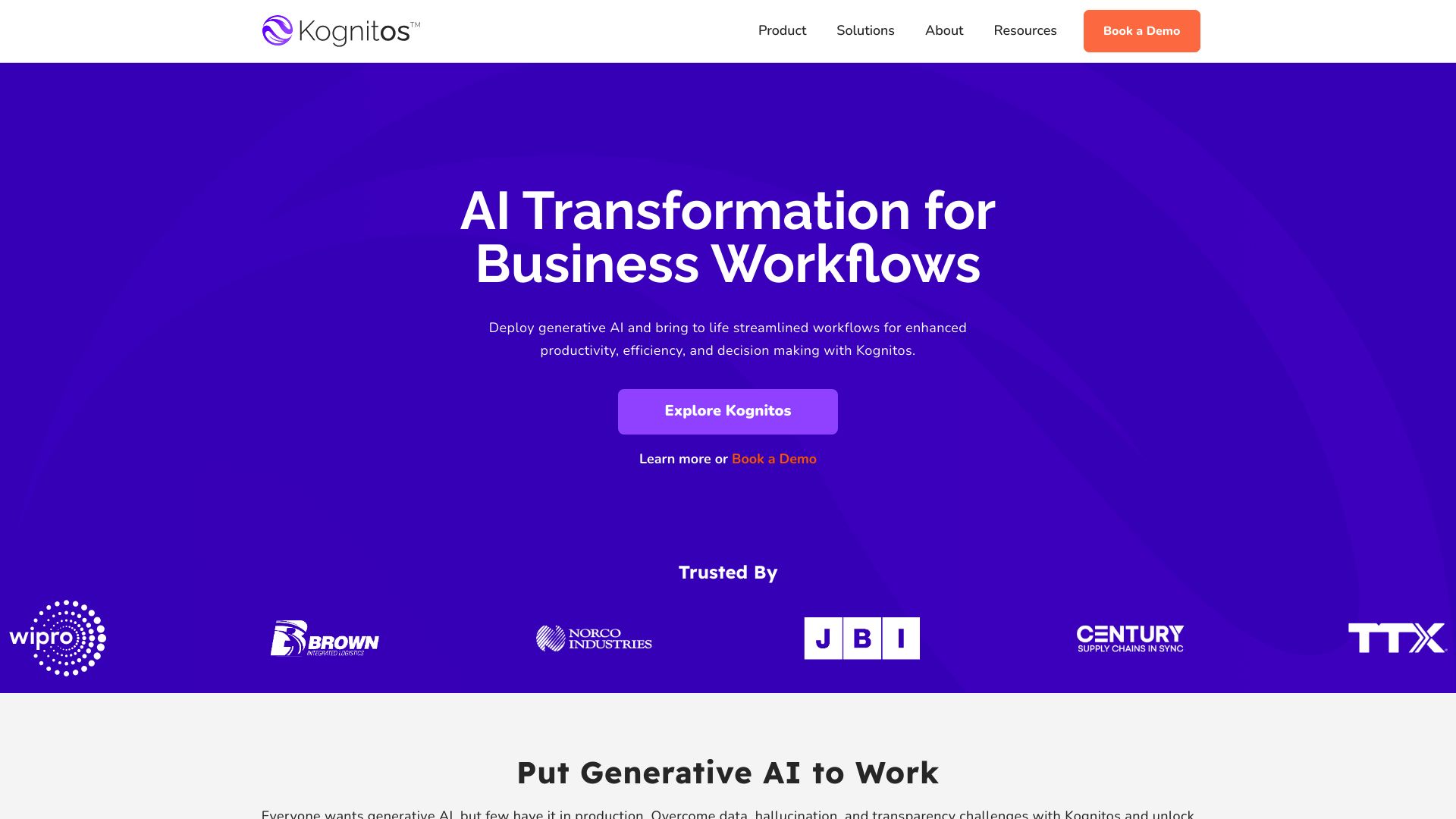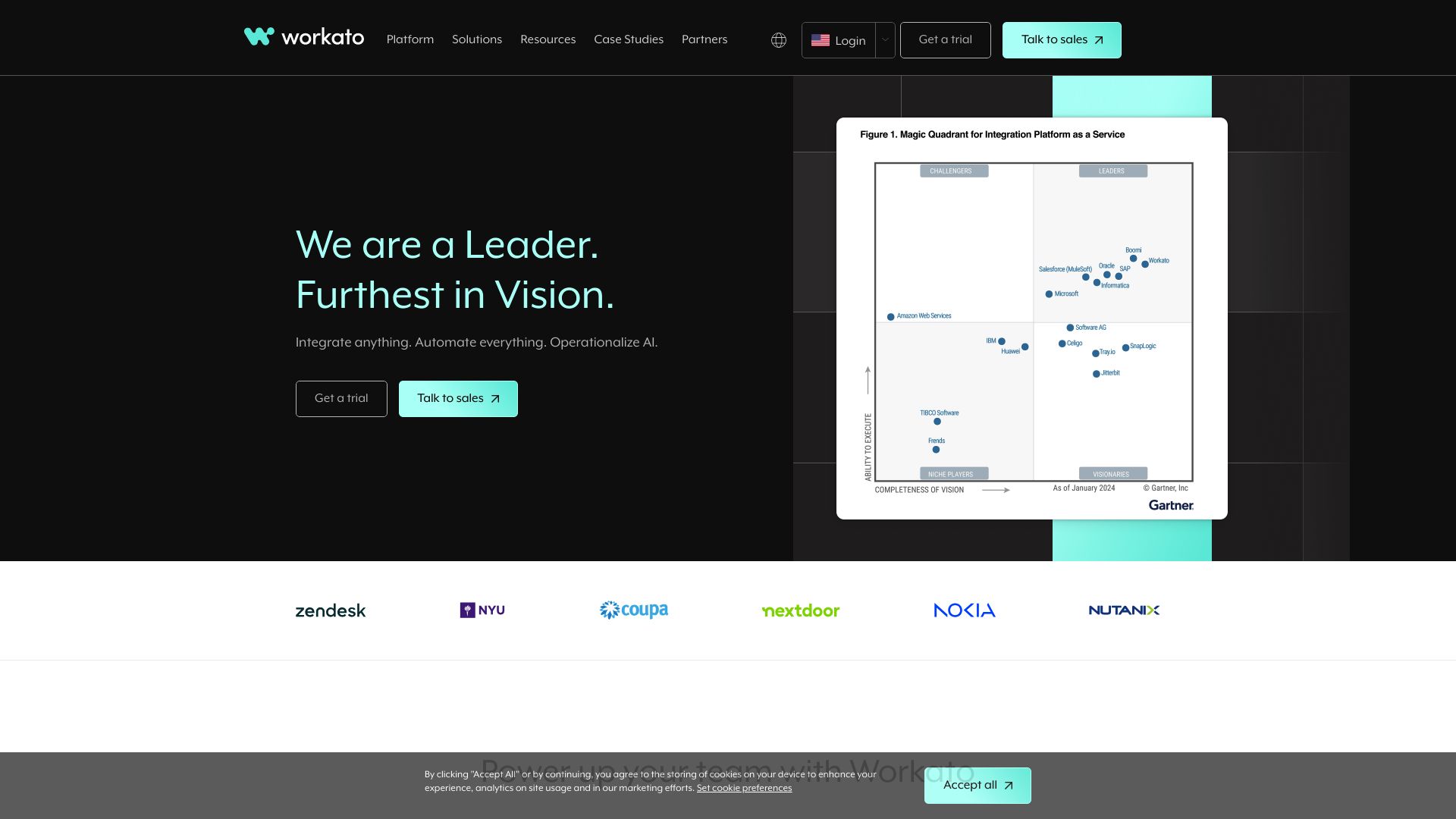Kognitos vs. Workato: AI-Powered Automation Platforms Compared
AI-powered automation platforms revolutionize how businesses streamline operations and boost productivity. Kognitos vs. Workato stand out as leading solutions, each offering unique approaches to workflow automation and AI integration. This comparison delves into the strengths and limitations of both platforms, exploring their key features, ease of use, and target audiences.
We’ll examine how Kognitos leverages natural language processing for intuitive automation creation, while Workato combines low-code tools with advanced AI capabilities. By the end, you’ll understand which platform best suits your organization’s needs and how SmythOS emerges as a superior alternative, offering unparalleled flexibility and AI-driven innovation.
Kognitos Overview
Kognitos revolutionizes business automation through AI-powered natural language processing. The platform enables users to create and manage complex workflows using plain English, eliminating the need for traditional coding. Kognitos interprets human language to automate tasks, handle exceptions, and learn from user interactions.


Kognitos caters to enterprises seeking efficient, scalable automation solutions. Its AI agents excel at document processing, data extraction, and integration with existing business systems. The platform’s ability to handle complex business logic and adapt to changing requirements makes it particularly valuable for industries with intricate workflows, such as finance, healthcare, and logistics.
Kognitos revolutionizes business automation through AI-powered natural language processing… eliminating the need for traditional coding.
Key features of Kognitos include its ability to learn and improve over time, seamless integration with third-party applications, and a robust system for handling exceptions. The platform maintains detailed audit logs, ensuring transparency and compliance in automated processes. Kognitos also emphasizes collaboration, allowing teams to work together on automation projects within designated departments or environments.
While Kognitos offers powerful automation capabilities, it may present a learning curve for users accustomed to visual programming interfaces. The platform’s focus on natural language processing, while innovative, might require users to adapt their approach to automation design. Additionally, the absence of a visual builder could limit options for those who prefer drag-and-drop interfaces for workflow creation.
Workato Overview
Workato provides a powerful automation platform that integrates AI capabilities with enterprise-grade workflow solutions. The platform excels in delivering robust, scalable automations that cater to complex business processes across various industries.


Workato’s AI-driven features, developed in collaboration with OpenAI, enable users to incorporate advanced AI models and prompts into their workflows without compromising data privacy. The platform offers a range of AI-powered tools, including text analysis, categorization, email drafting, and translation, enhancing the capabilities of traditional automation processes.
Workato’s AI-driven features… enable users to incorporate advanced AI models and prompts into their workflows without compromising data privacy.
The platform’s low-code/no-code interface democratizes automation, allowing both technical and non-technical users to create sophisticated workflows. This accessibility, combined with Workato’s comprehensive integration capabilities, positions it as a versatile solution for organizations seeking to streamline operations and drive digital transformation.
Workato’s enterprise focus shines through its scalability, security measures, and governance features. The platform supports robust data storage, customizable user interfaces, and seamless integration with existing enterprise systems. However, the complexity of initial setup and potential high costs for large-scale implementations may present challenges for some organizations.
While Workato offers significant advantages in terms of AI integration and enterprise-grade features, users should be aware of certain limitations. The platform imposes rate limits on AI actions, which may restrict usage for high-volume scenarios. Additionally, the lack of granular permission settings for AI features could pose challenges in organizations with strict access control requirements.
Feature Comparison
Kognitos and Workato offer distinct approaches to automation and AI integration. Kognitos focuses on natural language processing for automation, allowing users to create workflows using plain English. This approach simplifies complex process automation for non-technical users. In contrast, Workato provides a more traditional low-code/no-code platform with AI capabilities integrated into its workflow builder.
A key difference lies in their visual interfaces. Kognitos lacks a visual builder, relying instead on its natural language processing capabilities. Workato offers a more conventional drag-and-drop interface, which may be more familiar to users accustomed to traditional automation tools. This disparity impacts the learning curve and accessibility for different user groups.
In terms of security and enterprise readiness, both platforms offer robust features, but with different emphases. Workato provides more granular control over permissions and data access, catering to enterprise-level security requirements. Kognitos, while secure, focuses more on adaptability and learning from user interactions to improve its automations over time. This difference highlights Kognitos’ strength in handling dynamic, evolving processes, while Workato excels in maintaining strict governance and compliance standards.
Feature Comparison Table
| Kognitos | Workato | SmythOS | |
|---|---|---|---|
| CORE FEATURES | |||
| Visual Builder | ❌ | ✅ | ✅ |
| Autonomous Agents | ✅ | ❌ | ✅ |
| Multimodal | ✅ | ❌ | ✅ |
| Multi-Agent Collaboration | ✅ | ❌ | ✅ |
| SECURITY | |||
| Constrained Alignment | ❌ | ❌ | ✅ |
| IP Control | ❌ | ✅ | ✅ |
| COMPONENTS | |||
| Huggingface AIs | ✅ | ❌ | ✅ |
| Zapier APIs | ❌ | ❌ | ✅ |
| Data Lakes | ❌ | ❌ | ✅ |
| DEPLOYMENT OPTIONS (EMBODIMENTS) | |||
| Deploy as Webhook | ❌ | ✅ | ✅ |
| Deploy as Site Chat | ❌ | ✅ | ✅ |
| Deploy as GPT | ❌ | ✅ | ✅ |
| DATA LAKE SUPPORT | |||
| Hosted Vector Database | ❌ | ❌ | ✅ |
| Sitemap Crawler | ❌ | ❌ | ✅ |
| YouTube Transcript Crawler | ❌ | ❌ | ✅ |
| URL Crawler | ❌ | ❌ | ✅ |
Best Alternative to Kognitos and Workato
SmythOS stands out as the superior alternative to Kognitos and Workato, offering a comprehensive AI automation platform that combines power, flexibility, and ease of use. Our platform addresses the limitations of both competitors while providing a more robust and versatile solution for businesses of all sizes.
We’ve designed SmythOS with a user-friendly visual builder that surpasses Kognitos’ natural language approach and Workato’s traditional drag-and-drop interface. This intuitive design allows users to create complex AI workflows without extensive coding knowledge, making advanced AI capabilities accessible to a broader audience.
SmythOS stands out as the superior alternative to Kognitos and Workato, offering a comprehensive AI automation platform that combines power, flexibility, and ease of use.
Unlike Kognitos and Workato, SmythOS excels in multi-agent collaboration and autonomous agent deployment. Our platform enables teams of AI agents to work together seamlessly on complex tasks, enhancing efficiency and scalability. This feature sets us apart in handling dynamic, evolving processes while maintaining strict governance and compliance standards.
SmythOS offers unparalleled deployment options, including API, webhook, site chat, and GPT integrations. This versatility ensures that our AI solutions can be seamlessly integrated into existing systems across various platforms. Additionally, our hosted vector database and extensive data lake support provide robust data management capabilities that neither Kognitos nor Workato can match.
By choosing SmythOS, users gain access to a platform that not only meets current automation needs but also scales effortlessly to future demands. Our commitment to continuous innovation and user-centric design makes SmythOS the ideal choice for businesses looking to harness the full potential of AI automation.
Conclusion
Kognitos and Workato offer powerful automation solutions with distinct approaches. Kognitos excels in natural language processing, allowing users to create workflows using plain English. This innovative approach simplifies complex automations for non-technical users. Workato, on the other hand, provides a more traditional low-code/no-code platform with integrated AI capabilities, catering to users familiar with visual interfaces.
While both platforms have their strengths, SmythOS emerges as the superior choice for businesses seeking comprehensive AI integration and versatile deployment options. Our platform combines the best of both worlds – an intuitive drag-and-drop interface with support for natural language processing and advanced AI models. SmythOS’s extensive integration ecosystem, featuring over 300,000 pre-built connectors, surpasses both Kognitos and Workato in terms of flexibility and scalability.
SmythOS stands out with its ’Create Once, Deploy Anywhere’ philosophy, allowing users to build AI agents that can be seamlessly integrated across multiple environments. This unparalleled versatility, coupled with our support for multi-agent orchestration and a wide range of AI models, positions SmythOS as the ideal solution for businesses looking to harness the full potential of AI automation.
Ready to experience the future of AI automation? Explore our diverse range of AI-powered agent templates to jumpstart your journey. For a deeper dive into SmythOS’s capabilities, check out our comprehensive documentation. Take the first step towards transforming your workflow – create your free SmythOS account today and join the AI revolution.
Last updated:
Disclaimer: The information presented in this article is for general informational purposes only and is provided as is. While we strive to keep the content up-to-date and accurate, we make no representations or warranties of any kind, express or implied, about the completeness, accuracy, reliability, suitability, or availability of the information contained in this article.
Any reliance you place on such information is strictly at your own risk. We reserve the right to make additions, deletions, or modifications to the contents of this article at any time without prior notice.
In no event will we be liable for any loss or damage including without limitation, indirect or consequential loss or damage, or any loss or damage whatsoever arising from loss of data, profits, or any other loss not specified herein arising out of, or in connection with, the use of this article.
Despite our best efforts, this article may contain oversights, errors, or omissions. If you notice any inaccuracies or have concerns about the content, please report them through our content feedback form. Your input helps us maintain the quality and reliability of our information.
